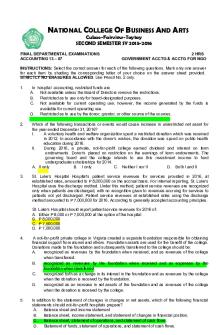Etymology - simple i hope it is helpful PDF

| Title | Etymology - simple i hope it is helpful |
|---|---|
| Author | Anonymous User |
| Course | BSA |
| Institution | Bulacan State University |
| Pages | 2 |
| File Size | 65.4 KB |
| File Type | |
| Total Downloads | 13 |
| Total Views | 169 |
Summary
simple i hope it is helpful...
Description
1. Etymology of Philosophy
The original meaning of the word philosophy comes from the Greek roots philo-meaning “love” and –sophos meaning “wisdom”, thus, philosophy is love of wisdom. Philosophy asks questions about what people believe, as well as examining ourselves and our beliefs. It attempts to answer life’s ‘Big Questions’, simply knowing the meaning of life.
2. Western vs. Eastern Definition of Philosophy and their Differences
Western philosophy is mainly used in the Western parts of the world, such as in the European countries. Socrates is considered the father of western philosophy. Eastern philosophy is prevalent in Asian countries. DIFFERENCES
Western Philosophy
Eastern Philosophy
- Logical, scientific, and rational - Focuses on the finding the differences in ideas - Focused on the ideas in parts - Deals with Individualism - More individualistic, trying to find the meaning of life here and now with self at the center as it is already given and part of the divine.
- Concept of eternal and recurring. - Focuses on the similarities. - Generalize the ideas and show how they reflect the same truths. - Collectivism - Drawn much more into groups or society or people’s actions and thoughts as one in order to find meaning in life.
3. Branches of Philosophy ETHICS - Ethics, also known as moral philosophy, is often referred to as the study of morality. It seeks to address questions about how we should live our lives, how we define proper conduct, and what we mean by the good life. It’s a study that teaches us what the virtuous life is like and how we can put these virtues into practice. Basically, it is the study of what is right and wrong. AESTHETICS - Aesthetics refers to the study of everything related to beauty, art, and good taste. This includes how we define art, how we feel when viewing art or witnessing beauty, how we judge works of art, and how we form our taste. METAPHYSICS
- Metaphysics is the philosophical branch that studies reality, existence, the nature of being, the physical world, and the universe. LOGIC - Logic is the branch of philosophy that studies reasoning. It teaches us how to differentiate between good and bad reasoning and how to construct valid arguments. EPISTEMOLOGY - Epistemology is often referred to as the theory of knowledge. It delves into the definition, scope, and parameters of knowledge and knowledge formation. It seeks to explain how we acquire knowledge, how knowledge relates to notions like justification, truth, and belief, and how and where it falls in the spectrum of certainty and error. POLITICAL PHILOSOPHY - Political Philosophy examines various concepts related to politics, government, laws, liberty, justice, rights, authority, state, and even ethics (ethical ruling). It discusses how states should be built and run, and how its constituents should act....
Similar Free PDFs

Phy ed 2 - I hope it helps
- 11 Pages

IA1 - Hope it help.
- 30 Pages

- Assesment 3b - Hope it helps
- 6 Pages

TORT Damage - hope it helps
- 2 Pages

Etymology
- 2 Pages

Diosdado Macapagal - This is helpful
- 24 Pages
Popular Institutions
- Tinajero National High School - Annex
- Politeknik Caltex Riau
- Yokohama City University
- SGT University
- University of Al-Qadisiyah
- Divine Word College of Vigan
- Techniek College Rotterdam
- Universidade de Santiago
- Universiti Teknologi MARA Cawangan Johor Kampus Pasir Gudang
- Poltekkes Kemenkes Yogyakarta
- Baguio City National High School
- Colegio san marcos
- preparatoria uno
- Centro de Bachillerato Tecnológico Industrial y de Servicios No. 107
- Dalian Maritime University
- Quang Trung Secondary School
- Colegio Tecnológico en Informática
- Corporación Regional de Educación Superior
- Grupo CEDVA
- Dar Al Uloom University
- Centro de Estudios Preuniversitarios de la Universidad Nacional de Ingeniería
- 上智大学
- Aakash International School, Nuna Majara
- San Felipe Neri Catholic School
- Kang Chiao International School - New Taipei City
- Misamis Occidental National High School
- Institución Educativa Escuela Normal Juan Ladrilleros
- Kolehiyo ng Pantukan
- Batanes State College
- Instituto Continental
- Sekolah Menengah Kejuruan Kesehatan Kaltara (Tarakan)
- Colegio de La Inmaculada Concepcion - Cebu









